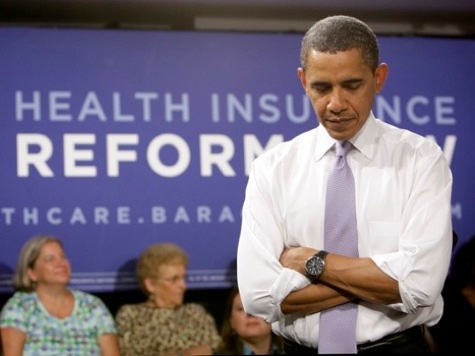ATLANTA (AP) — Democratic candidates are trying to figure out whether to embrace or avoid President Barack Obama’s health care overhaul — or land somewhere in between.
The president says his party shouldn’t apologize or go on the defensive about the Affordable Care Act.
Candidates aren’t so sure.
Two top recruits for Senate races — Michelle Nunn in Georgia and Alison Lundergan Grimes in Kentucky — won’t say how they would have voted when the Senate passed the bill in 2010. Their refusals are overshadowing their endorsements of individual parts of the law that are more popular than the law itself.
In Montana, Sen. John Walsh, appointed to office in February and now running for a full term, reminds voters that he was nowhere near Congress in 2010.
In Alaska, an advertisement by an outside group defends part of the law without mentioning it by name. Also, several incumbents who voted for the overhaul four years ago highlight some of its benefits and promise to tweak other parts.
Obama knows the law and this year’s elections will have much to say about his legacy, and he says, “There is a strong, good, right story to tell” about the law.
But so far in the 2014 midterm elections, that bold approach hasn’t taken hold. Instead, it’s a more nuanced one.
“I believe we need to move forward and build on what’s working … and fix the things that are not,” said Nunn. That was one of her many attempts to clarify previous remarks that it was “impossible” for her to say how she would have voted on legislation she had no role in negotiating.
Nunn will face Rep. Jack Kingston or businessman David Perdue, who meet in a July 22 Republican runoff.
Grimes twice refused to answer the yes-or-no question last week, offering a similar argument as she began her general election campaign to unseat Mitch McConnell, the Republican leader in the Senate.
“I, when we are in the United States Senate, will work to fix the Affordable Care Act,” she said.
Walsh, at a recent forum, had this to say: “I was preparing soldiers and airmen to deploy to Iraq and Afghanistan. So I did not vote on the Affordable Care Act — just want to make that clear.” Walsh spent 33 years in the Montana National Guard, and became the state’s adjutant general in 2008, resigning from that post in 2012 to run for lieutenant governor.
Those answers reflect challenging political realities for Democrats in an election year that favors Republicans.
The GOP must gain six Senate seats to reclaim the majority. Democrats must defend seven seats — five incumbents, counting Montana — in states Obama lost in 2012 and where he remains broadly unpopular.
Nunn and Grimes must woo voters in states that give Obama approval ratings even lower than his national rating.
The GOP is heavily favored to maintain its House majority.
It’s no surprise that Republicans are dusting off their playbook, even after many GOP lawmakers have acknowledged that the law is here to stay.
“We will repeal and replace Obamacare,” said McConnell, who defeated a primary challenger last Tuesday. McConnell repeatedly cast Grimes as a stand-in for Obama.
Republicans have gone after Sens. Mark Begich of Alaska, Kay Hagan of North Carolina, Mary Landrieu of Louisiana and Mark Pryor of Arkansas for being “the deciding vote for Obamacare.” Ads hit those states after the disastrous early rollout of online insurance exchanges that allow people to shop for private policies.
Democrats say that message is oversimplified. White House political advisers insist there are openings to go on offense, with the website fixed and enrollment numbers exceeding 8 million to counter the GOP’s argument that the law is a failure.
The challenge for Democrats is to highlight the popular parts of the law.
“I’m glad that people with pre-existing conditions have access to health care for the first time,” Nunn said. “I talk to parents who are so grateful for the opportunity to cover their children until the age of 26. They sleep better at night. And we know that families don’t want to go back to a time when families are threatened with bankruptcy as a result of a lifetime limit” on claims payments.
In Alaska, a super political action committee called Put Alaska First started airing TV ads last month featuring one of the law’s beneficiaries, a breast cancer survivor previously denied coverage.
Landrieu, Hagan and Nunn have tried to put Republicans on the defensive by criticizing their states’ GOP leaders for not expanding Medicaid under the law.
Other Democrats have found ways to defend the overhaul.
Trying to return as Florida governor, Republican-turned-Democrat Charlie Crist champions the law as he tries to unseat Republican Rick Scott.
Grimes points to Kentucky’s relatively smooth implementation of the law under Democratic Gov. Steve Beshear. “I am not and will not be for taking away insurance that 400,000 Kentuckians just recently got access to,” she said.
That put McConnell on tricky ground.
On Friday, he struggled to answer what would happen to those who use “Kentucky Kynect,” the state-run exchange that wouldn’t exist without the health law. He insisted that the fate of his state’s program was not linked to the president’s law.
___
Lederman reported from Washington. Associated Press writer Adam Beam in Frankfort, Kentucky, contributed to this report.

COMMENTS
Please let us know if you're having issues with commenting.